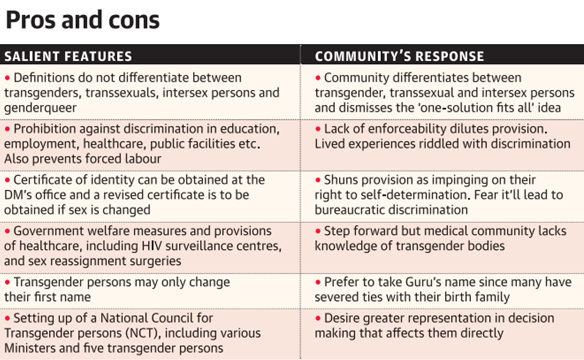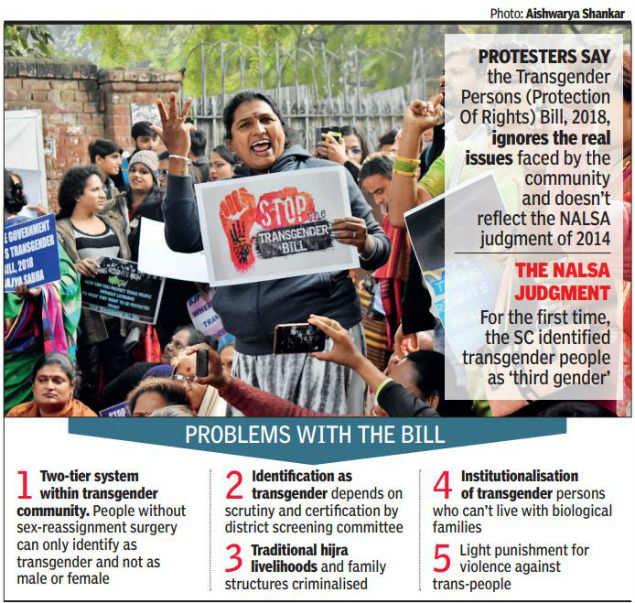Context
The Parliament has passed the Transgender Persons (Protection of Rights) Bill, 2019, with the Rajya Sabha approving it by a voice vote. The Lok Sabha had already passed the bill in December 2018.
Why need such a bill?
- Transgender individuals in India often face stigma and systematic exclusion in education and employment.
- As a result, some feel they have no alternative but to turn to sex work.
- Trans individuals also face disproportionate public violence and police brutalities.
Background:
- In 2013, the government set up an expert committee to study the problems of transgenders and recommend solutions.
- The committee, comprising experts from various fields and members of the community, also looked at past experience as in the State of Tamil Nadu, which had set up a welfare board for transgender persons.
- TN has made recommendations right from allowing a ‘third gender’ in official forms, to setting up of special toilets and customizing health interventions.
- In 2014, a private member Bill, The Rights of Transgendered Persons, was introduced in the Rajya Sabha by Tiruchi Siva, a Member of Parliament from Tamil Nadu.
- It looked at a range of entitlements of such persons, providing specifically for them in health, education sectors, skill development and employment opportunities, and protection from abuse and torture.
- It was passed in the Rajya Sabha.
- In 2016, the Government introduced its own Bill in the Lok Sabha which made a number of recommendations including defining the term persons with intersex variations, granting reservations for socially and educationally backward classes, and recognition of civil rights including marriage, partnership, divorce and adoption. However, with the dissolution of the 16th Lok Sabha (2014-19), that Bill lapsed.
Judicial subordination
- Indian courts have long held that trans people deserve the government’s recognition on their own terms, without mandatory intervention or discrimination.
- In 2014, the Indian Supreme Court in NALSA v. India ruled that transgender people should be recognized as a third gender and enjoy all fundamental rights, while also being entitled to specific benefits in education and employment.
- Justice K.S. Radhakrishnan, writing for the bench, ordered that “Transgender persons’ right to decide their self-identified gender” should be recognized by state and federal authorities.
- The court made clear that any insistence for [sex reassignment surgery] for declaring one’s gender is immoral and illegal.

Transgender in India
Count
- Indian census has never recognized the third gender, i.e., transgender while collecting census data for years.
- According to the 2011 Census, the number of persons who do not identify as ‘male’ or ‘female’ but as ‘other’ stands at 4,87,803 (0.04% of the total population)
- The 2011 census also reported 55,000 children as transgenders identified by their parents.
Issues
- Sexual health issues
- Transgender communities face several sexual health issues including HIV.
- Both personal- and contextual- level factors influence sexual health condition and access to and use of sexual health services.
- Mental health issues
- Some of the mental health issues reported in different community forums include depression and suicidal tendencies, possibly secondary to societal stigma, lack of social support and violence-related stress.
- Most transgender people, especially youth, face great challenges in coming to terms with one’s own gender identity which are opposite to that of the gender identity imposed on them on the basis of their biological sex.
- They face several other related issues such as: shame, fear, and internalized transphobia; adjusting, adapting, or not adapting to social pressure to conform; fear of loss of relationships; and self-imposed limitations on expression or aspirations.
- Violence
Multiple studies have shown that transgender people across the age spectrum face alarmingly high rates of physical and verbal violence, including child abuse, sexual violence, intimate partner violence, workplace violence and hate crimes.
- Social Exclusion
Social Exclusion Framework is increasingly used in highlighting the issues and problems faced by disadvantaged and disenfranchised groups.
- Family – Most families do not accept if their male child starts behaving in ways that are considered feminine or inappropriate to the expected gender role. Consequently, family members may threaten, scold or even assault their son/sibling from behaving or dressing-up like a girl or woman.
- Heath care Setting – Often, healthcare providers rarely had the opportunity to understand the sexual diversities and they do not have adequate knowledge about the health issues of sexual minorities.
- Lack of livelihood options – Most employers deny employment for even qualified and skilled transgender people. Lack of livelihood options is a key reason for a significant proportion of transgender people to choose or continue to be in sex work.
- Residence – The community is grossly discriminated by Indian Society when it comes to renting or selling the house to a transgender.
- Insurance – Health insurance companies often systematically exclude transition-related care and in many cases, these exclusions are used to deny coverage for a wide range of care for transgender people that may or may not have any connection to gender transition.

Various Provisions of The Transgender Persons (Protection of Rights) Bill, 2019 includes:
Defining Transperson
- The Bill defines a transgender person as one whose gender does not match the gender assigned at birth.
- It includes trans-men and trans-women, persons with intersex variations, gender-queers, and persons with socio-cultural identities, such as kinnar and hijra (eunuch).
Prohibition against discrimination
- It prohibits the discrimination against a transgender person, including denial of service or unfair treatment in relation to education, employment, healthcare, access to, or enjoyment of goods, facilities, opportunities available to the public.
- Every transgender person shall have a right to reside and be included in his household.
- No government or private entity can discriminate against a transgender person in employment matters, including recruitment, and promotion.
HRD measures
- A transgender person may make an application to the District Magistrate for a certificate of identity, indicating the gender as ‘transgender’.
- Educational institutions funded or recognised by the relevant government shall provide inclusive facilities for transgender persons, without discrimination.
- The government must provide health facilities to transgender persons including separate HIV surveillance centres, and sex reassignment surgeries.
Grievances redressal
- The National Council for Transgender persons (NCT) chaired by Union Minister for Social Justice, will advise the central government as well as monitor the impact of policies with respect to transgender persons.
- It will also redress the grievances of transgender persons.
Legal Protection
The Bill imposes penalties for the offences against transgender persons like bonded labour, denial of use of public places, removal from household & village and physical, sexual, verbal, emotional or economic abuse.

Positive Impact of the Bill:
- The Bill will benefit a large number of transgender persons, mitigate the stigma, discrimination and abuse against this marginalized section and bring them into the mainstream of society.
- This will lead to inclusiveness and will make the transgender persons productive members of society.
What were the objections to the Bill?
Binary concept of gender
- Activists had problems right from the beginning, starting with the name.
- ‘Transgender’ was restrictive, they argued, and it showed a lack of understanding of the complexities in people who do not conform to the gender binary, male/female.
- Rejecting ‘Transgender’ as the nomenclature, they suggested instead that the title should be a comprehensive “Gender Identity, Gender Expression and Sex Characteristics (Protection of Rights) Bill”, and in definition, sought to introduce the distinction between transgender and intersex persons upfront.
- Members of the community perceive transgender as different from intersex and were insistent that the distinction be made in the Bill.
No Self-determination
- While the Act is progressive in that it allows self-perception of identity, it mandates a certificate from a district magistrate declaring the holder to be transgender.
- This goes against the principle of self-determination itself, activists argue, also pointing out that there is no room for redress in case an appeal for such a certificate is rejected.
Others
- One long-pending demand has been to declare forced, unnecessary and non-consensual sex reassignment surgery illegal, and to enforce punitive action for violations.
- Transgender and intersex persons might require a range of unique health care needs, and that should have been incorporated into the Act, activists say.
- While the Act envisages the setting up of a National Council to provide the institutional framework for its implementation, suggestions on the composition of such a council, or the demand to set up a working group for a Council for Intersex Persons were also ignored.
Way Forward:
- The mention of intersex persons in the Indian bill is an important inclusion but the bill should be renamed the Rights of Transgender and Intersex Persons Bill and include explicit protections for intersex people in line with India’s international human rights obligations.
- The bill should be revised to emphasize training teachers to help them adopt inclusive teaching methods to ensure that children are not harassed or discriminated against by staff or other children.
- Certain provisions of Private member bill introduced in 2014 by Tiruchi Siva can also be incorporated such as reserving 2% of seats in education institutions funded by the government, formation of special employment exchanges for transgender people n government jobs, etc.
- The bill should be provisioned in such a manner that it is able to integrate transgender persons seamlessly into the fabric of everyday public life be it public spaces, at workplaces, and in normative domestic spaces.
- Policies and regulation alone won’t help there is a need to increase awareness and inculcate a sense of respect and acceptance for the transgender community.
- Their grievance of being not included in policies formulation or decision making needs to be allayed and chances for their public participation should increase.
- The government should implement stigma and discrimination reduction measures through a variety of ways like mass media awareness for the general public to focused training and sensitization for police and health care providers.
- India should take lessons from Thailand. It is one of those model countries wherein all the required facilities are being made available to the Transgender Community.
- Parents of the Transgender need to be counselled appropriately in order to treat Kinnar children at par with other normal children
- There should be a proper census of the community. The community should be involved in this exercise. For the time being, the United Nations Development Programme(UNDP has more authentic data on Transgender in India. It could be used for planning welfare schemes.
- Ministry of Social Justice and Empowerment should take up research studies to generate more evidence to design the programs and interventions for the community.
- The ministry should also compile the existing experiences /interventions taken by many states like Tamil Nadu, Maharashtra, Sikkim, and Delhi etc.
The Bill must recognise that gender identity must go beyond biological; gender identity is an individual’s deep and personal experience. It need not correspond to the sex assigned at birth. It includes the personal sense of the body and other expressions such as one’s own personal inducing proceeds.
References
https://www.hrw.org/news/2019/12/05/indias-transgender-rights-law-isnt-worth-celebrating
https://indianexpress.com/article/explained/what-the-transgenders-rights-bill-passed-by-lok-sabha-says-5896444/
https://indianexpress.com/article/opinion/columns/nartaki-nataraj-tiruchi-siva-my-gender-is-my-right-transgender-community-6144704/

